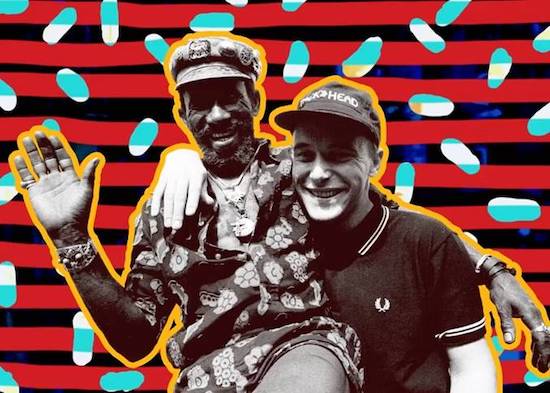Photo credit: Kishi Yamamoto
Lee ‘Scratch’ Perry is one of those enigmatic figures whose aura is so shrouded in mystery and mythology that it’s difficult to get any clear sense of who he actually is. He’s one of the twentieth century’s most prolific and influential producers, whose presence lurks behind countless dub, reggae and ska records. But more often than not, he’s reduced to a cartoonish caricature, his idiosyncratic worldview reduced to the ravings of an eccentric.
Rainford, his latest release, goes some way to unpicking some of this mythology. The choice of his birth name as the LP’s title indicates a homecoming of sorts – a retracing of the steps along his journey towards global dub icon. The song ‘Autobiography Of An Upsetter’ gives an insight into his early life and upbringing. The track describes his birth on a former plantation in Jamaica in 1936 and how his mother believed her child would go on to become “a godly being”. Perry recounts his musical and spiritual adventures, his work with Jamaican producers Duke Reid and Coxsone Dodd, and his travels to London, where he eventually encountered Adrian Sherwood.
It’s a crucial detail, because the album is as much a Sherwood record as it is a Perry one. The two have been friends and collaborators since the 1980s, and the album reflects the transfer of ideas between the two over the last three decades, mirroring the wider cultural exchange between the UK and Jamaica via the umbilical cord of dub. Sherwood has always been one of the most openminded of British dub producers: he was quick to grasp the potential of the studio techniques invented by Perry, King Tubby, and others in transforming and reinvigorating genres like post-punk and hip hop. As a result, he’s responsible for a massive output of experimental releases on his On-U Sound label, which he’s been running since 1979.
Sherwood’s deft and unusual production style shapes the album, from the stabs of cello on ‘Let It Rain’ to the snare on ‘Cricket On The Moon’, which sounds like a sheet of metal being whacked with a mallet. Things get weirder on ‘Makumba Rock’, a track with a heavy Brazilian influence. The album was recorded using session musicians from Brazil, Jamaica, and the UK and the howling sound of the cuica, a drum more frequently heard in Samba, leaps in and out of the arrangement. Tracks like this hone in on the strangeness of Perry’s imagination: pan-African cosmology, streams of consciousness, animal noises, and Perry bawling like a baby all collide in a mishmash that is oddly coherent despite making no sense at all.
The other stand-out track is ‘African Starship’. Built around a slow, sludgy rhythm, Perry muses on the possibilities of Marcus Garvey’s Black Star Liner embarking on intergalactic voyages as snippets of guitar, muted trumpet and spacey effects flicker in the background. It’s a reminder of the radical, destabilising trajectory that dub veered towards early on, escaping the bounds of the Jamaican studios in which it was birthed and disrupting pretty much all other genres of music it came across.
‘African Starship’ makes an appearance on Pay It All Back Volume 7, also out on On-U Sound. The Pay It All Back series started back in the 80s as a way for Sherwood to give thanks to the various artists who contributed to the label’s forward-thinking ethos. As such, it’s a pretty broad album, full of familiar names including Roots Manuva, Pinch, Congo Natty, and one of Sherwood’s longest-running projects, African Head Charge.
Notable tunes include the prescient ‘Fake Days’, a moody collaboration between Sherwood, Pinch, and Leeds-based singer and MC LSK, who intones against the “fake personas, fake stars, fake music, fake lands” of the modern world. LSK also features on ‘Way of the World’, which brought to mind Horace Andy’s vocal on Massive Attack’s ‘Hymn Of The Big Wheel’, a slow, churning rallying cry against injustice.
Sparse drums and guitar collide with an earthy wobble bass on ‘Toby’s Place’ by Gary Lucas, Arkell and Hargreaves, a track which sits somewhere in-between dub-punk and dubstep. Even more unexpected vibes come from Japanese post-punk trio Nisennenmondai, who Sherwood encountered on a trip to Tokyo, and whose ‘A’ – Live in Dub (edit)’ he transforms into a spiky minimalist masterpiece. The album is a reminder of the crucial role Sherwood has played over the past couple of decades, both behind the scenes as a producer, and an as an artist in his own right, taking on the mantle started by Perry in his Black Ark studio all those years ago and ensuring that the musical voyage that began there continues to alter the musical landscape in unexpected ways.



